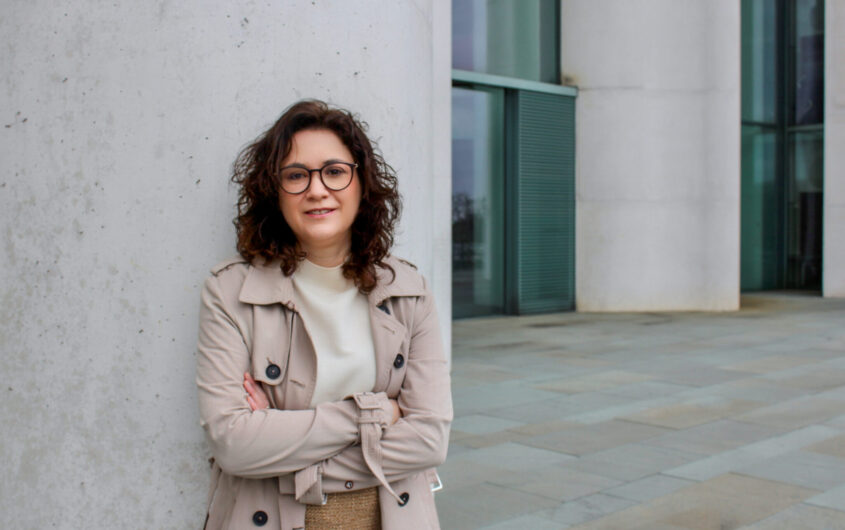
AGI Profiles: Sarah Ryglewski

Katie Hausman
Halle Foundation/AGI Intern
Katie Hausman is a Halle Foundation/AGI Intern in summer 2024. She is a recent graduate from American University’ School of International Service where she received a BA in International Studies and minors in Environmental Science and German Language. Having studied European governance and environmental sustainability, she is excited to apply her interests to policy work in the transatlantic relationship between the United States and Germany. After her internship at AGI, Ms. Hausman will be a U.S. Teaching Assistant through Fulbright Austria for the upcoming school year. She is excited to interact with students abroad and practice the German language, even if it may be an Austrian dialect!
Minister of State to the Federal Chancellor
Transitioning from the Ministry of Finance to the Federal Chancellery in 2021, Sarah Ryglewski currently manages federal-state relations as the Minister of State to the Federal Chancellor. Since August of 2022, she has also led the State Secretary Committee for Sustainable Development in the Federal Chancellery.
Background
Born in 1983 in Cologne, Ryglewski was exposed to politics at a young age. She gained her first political experience in her teenage years participating in the environmental movement in the 1990s and protesting right-wing extremism. Moving to Bremen to study political science in 2002, she became attached to the people and neighborhoods of the city, eventually making it her home. While attending university, she was the regional chairwoman of Jusos, the youth branch of the Social Democratic Party (SPD). She was an elected member of the Bremen Parliament (Bremische Bürgerschaft) from 2011-2015. At the same time, she was the spokesperson on consumer protection issues for the SPD. She became a member of the German Bundestag in 2015 and later transitioned to State Secretary to the Federal Minister of Finance from 2019-2021. She served on various committees, including finance, legal affairs, petitions, and budget. Now she is the Minister of State to the Federal Chancellor, acting as a liaison between the federal government and the German states.
Promoting Sustainability
Labeling it the “issue of our time,” Ryglewski uses the principle of sustainability as the federal government’s guiding force. At the first meeting of the State Secretaries Committee for Sustainable Development, she launched six transformation teams that are responsible for the multiple prongs of the German Sustainability Strategy. The strategy includes seven topic areas: human well-being and skills and social justice, energy transition and climate protection, circular economy, sustainable construction and transport transition, sustainable agricultural and food systems, pollution-free environment, as well as an additional area for international concerns. Dedicated to the energy transition and climate protection area of the plan, Ryglewski recently helped pass an amendment to the Federal Immission Control Act (BImSchG) to accelerate approval procedures for renewable energies and industry reconfiguring to hasten clean energy implementation.
Launched in September 2022 under Ryglewski’s oversight, the Network for Joint Action for Sustainable Development is a database in which social actors and private businesses can collaborate with one another to boost visibility and forge cross-sector alliances. One function of the hub is identifying and implementing the 17 Sustainable Development Goals (SDGs). The 17 SDGs stem from the 2030 Agenda of the United Nations, but they have been adopted as guiding principles of the federal government. Projects range from local seed dispensers made from retired gumball machines to sustainable electronic upcycling. Ryglewski says that this sustainability hub “enables committed individuals with new ideas to network and to prepare specific campaigns” and hopes for an increased private capacity to promote sustainability.
Not only managing federal and state relations, Ryglewski regularly discusses issues with young stakeholders and local communities. She met with representatives of the youpaN, the young forum of the National Platform Education for Sustainable Development (BNE), and members of the youth participation committees to listen to their perspectives on the 17 SDGs and their involvement in the German Sustainability Strategy in late June. Her incorporation of community voices in her work lends to her passion for ensuring equality in her policies.
Expanding Equal Opportunities
A first-gen student in her family, Ryglewski came to focus on questions of equality of opportunities at university. Asking questions like “what does inequality mean?” and “how can it be measured?” in her courses, she looked to understand the world outside of the “academic ivory tower.” Questions of equality dominated her time in Jusos. During her studies, she worked for the “Wohnen in Nachbarschaften” (WiN, Living in Neighborhoods) district project. As district manager, she interacted with both political boards and local stakeholders to make social and environmental designs for neighborhoods.
Her decision to become a politician was grounded in the idea that young people belong in parliament. She is now the youngest state secretary in office. With her local work and university study, Ryglewski knew that she could use her position in politics to help not only the youth population but also bring a more local understanding of equity and equality issues to the forefront.
Recently, Ryglewski helped pass a law to improve working conditions and sustainability of the German postal system. Consumers can use a voluntary eco-label to track the greenhouse gas emissions associated with their parcels. Furthermore, access to the market will be linked to regulatory compliance for working conditions, ensuring the safety and security of postal workers. Ryglewski is also working to make student finance more equitable, revitalizing the Bundesausbildungsforderungsgesetz (BAföG), Germany’s Federal Training Assistance Act. In this newly revised legislation, mini-jobs are exempt from tax, students will have until their fifth semester rather than their fourth to change their field of study, and students will have an increased housing allowance. By ensuring fairness and equity for career professionals and students, Ryglewski continues to reflect her political promises throughout her time in office.








